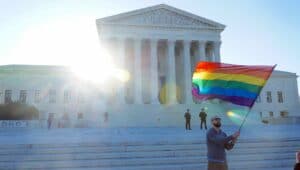
A person waves a rainbow flag in front of the U.S. Supreme Court in 2015. Photo by Ted Eitan | Flickr/CC BY-SA 2.0
The Supreme Court ruled Monday that a landmark civil rights law protects gay, lesbian and transgender people from discrimination in employment, a resounding victory for LGBTQ rights from a conservative court. The move could open the door to adding gender identity and sexual orientation to the categories protected by the Fair Housing Act.
The court decided by a 6-3 vote that a key provision of the Civil Rights Act of 1964 known as Title VII that bars job discrimination because of sex, among other reasons, encompasses bias against people because of their sexual orientation or gender identity.
“An employer who fires an individual for being homosexual or transgender fires that person for traits or actions it would not have questioned in members of a different sex,” Justice Neil Gorsuch wrote for the court. “Sex plays a necessary and undisguisable role in the decision, exactly what Title VII forbids.”
Gorsuch was joined in the majority by Chief Justice John Roberts and the court’s four liberal members. Justice Brett Kavanaugh, Trump’s other Supreme Court pick, dissented, along with Justices Samuel Alito and Clarence Thomas.
“The Court tries to convince readers that it is merely enforcing the terms of the statute, but that is preposterous,” Alito wrote in the dissent. “Even as understood today, the concept of discrimination because of ‘sex’ is different from discrimination because of ‘sexual orientation’ or ‘gender identity.’”
Alito’s dissent specifically warned that the decision could pave the way for new interpretations of the Fair Housing Act, which also explicitly bans discrimination on the basis of sex but not on the basis of sexual orientation or gender identity.
Such a change, however, would likely require additional litigation. Federal appeals courts across the country have been split on whether the Fair Housing Act’s sex discrimination provisions also cover discrimination against LGBTQ individuals.
In response to Monday’s announcement, LGBTQ rights group Lambda Legal urged Congress to pass a bipartisan law called the Equality Act, which would update the Fair Housing Act, the Civil Rights Act, Title IX and parts of the Affordable Care Act to confirm that discrimination based on sexual orientation or gender identity is unlawful. The House of Representatives passed the bill last year.
“Today’s decisions are an important victory, but alone are not enough to fill the gaping holes that remain in the hodgepodge patchwork of rights and protections that currently exist for LGBTQ people, particularly at a time when the Trump administration has sought to diminish those protections at every turn. We now look to Congress to address the critical gaps in our federal civil rights laws by passing the Equality Act,” Kevin Jennings, CEO of Lambda Legal, said in a statement. “Our communities are always vulnerable, but especially so during a national public health crisis. The House of Representatives passed the Equality Act over one year ago. We know senators can multitask. While they must address the dual pandemics of COVID-19 and discriminatory police violence, and the disproportionate impact both have on Black and Brown lives, they must also take the Equality Act over the finish line so that our communities can finally have comprehensive nondiscrimination protections.”
In 2016, NAR also adopted a motion to actively seek legislation that includes sexual orientation and gender identity as protected classes under the Fair Housing Act and following Monday’s ruling issued a statement repeating its support for the change..
“As we continue to pursue equal housing opportunities for all Americans, NAR will remain at the forefront of this fight,” NAR President Vince Malta, a broker at Malta & Co. Inc. in San Francisco, said in a statement.
Material from the Associated Press was used in this report.






